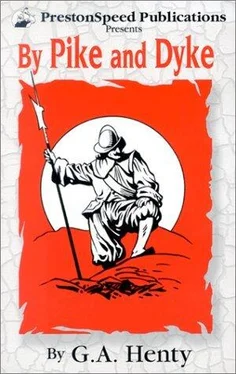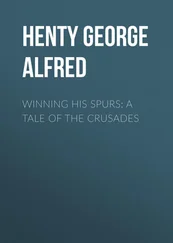G.A. Henty - By Pike and Dyke - A Tale of the Rise of the Dutch Republic
Здесь есть возможность читать онлайн «G.A. Henty - By Pike and Dyke - A Tale of the Rise of the Dutch Republic» весь текст электронной книги совершенно бесплатно (целиком полную версию без сокращений). В некоторых случаях можно слушать аудио, скачать через торрент в формате fb2 и присутствует краткое содержание. Жанр: Старинная литература, на английском языке. Описание произведения, (предисловие) а так же отзывы посетителей доступны на портале библиотеки ЛибКат.
- Название:By Pike and Dyke: A Tale of the Rise of the Dutch Republic
- Автор:
- Жанр:
- Год:неизвестен
- ISBN:нет данных
- Рейтинг книги:5 / 5. Голосов: 1
-
Избранное:Добавить в избранное
- Отзывы:
-
Ваша оценка:
- 100
- 1
- 2
- 3
- 4
- 5
By Pike and Dyke: A Tale of the Rise of the Dutch Republic: краткое содержание, описание и аннотация
Предлагаем к чтению аннотацию, описание, краткое содержание или предисловие (зависит от того, что написал сам автор книги «By Pike and Dyke: A Tale of the Rise of the Dutch Republic»). Если вы не нашли необходимую информацию о книге — напишите в комментариях, мы постараемся отыскать её.
By Pike and Dyke: A Tale of the Rise of the Dutch Republic — читать онлайн бесплатно полную книгу (весь текст) целиком
Ниже представлен текст книги, разбитый по страницам. Система сохранения места последней прочитанной страницы, позволяет с удобством читать онлайн бесплатно книгу «By Pike and Dyke: A Tale of the Rise of the Dutch Republic», без необходимости каждый раз заново искать на чём Вы остановились. Поставьте закладку, и сможете в любой момент перейти на страницу, на которой закончили чтение.
Интервал:
Закладка:
Lillo was garrisoned by Antwerp volunteers, called the Young Bachelors, together with a company of French under Captain Gascoigne, and 400 Scotch and Englishmen under Colonel Morgan. Mondragon was ordered to take the place at any cost. He took up his position with 5000 men at the country house and farm of Lillo a short distance from the fort, planted his batteries and opened fire. The fort responded briskly, and finding that the walls were little injured by his artillery fire Mondragon tried to take it by mining. Teligny, however, ran counter mines, and for three weeks the siege continued, the Spaniards gaining no advantage and losing a considerable number of men. At last Teligny made a sortie, and a determined action took place without advantage on either side. The defenders were then recalled to the fort, the sluice gates were opened, and the waters of the Scheldt, swollen by a high tide, poured over the country. Swept by the fire of the guns of the fort and surrounded by water, the Spaniards were forced to make a rapid retreat, struggling breast high in the waves.
Seeing the uselessness of the siege, the attempt to capture Lillo was abandoned, having cost the Spaniards no less than two thousand lives. Parma's own camp was on the opposite side of the river, at the villages of Beveren, Kalloo, and Borght, and he was thus nearly opposite to Antwerp, as the river swept round with a sharp curve. He had with him half his army, while the rest were at Stabroek on the opposite side of the river, nearly ten miles below Antwerp. Kallo stood upon rising ground, and was speedily transformed into a bustling town. From this point an army of men dug a canal to Steeken, a place on the river above Antwerp twelve miles from Kalloo, and as soon as Ghent and Dendermonde had fallen, great rafts of timber, fleets of boats laden with provisions, munitions, building materials, and every other requisite for the great undertaking Parma had in view were brought to Kalloo.
To this place was brought also by Parma's orders the shipwrights, masons, ropemakers, sailors, boatmen, bakers, brewers, and butchers of Flanders and Brabant, and work went on unceasingly. But while the autumn wore on the river was still open; and in spite of the Spanish batteries on the banks the daring sailors of Zeeland brought up their ships laden with corn to Antwerp, where the price was already high. Had this traffic been continued Antwerp would soon have been provisioned for a year's siege; but the folly and stupidity of the municipal authorities put a stop to it, for they enacted that, instead of the high prices current for grain, which had tempted the Zeelanders to run the gauntlet of the Spanish batteries, a price but little above that obtainable in other places should be given. The natural result was, the supply of provisions ceased at once.
“Did you ever see anything like the obstinacy and folly of these burghers?” Sainte Aldegonde said in despair to Ned, when, in spite of his entreaties, this suicidal edict had been issued. “What possible avail is it to endeavour to defend a city which seems bent on its own destruction?”
“The best thing to do,” Ned replied in great anger, “would be to surround the town hall with the companies of Morgan's regiment remaining here, and to hang every one of these thick headed and insolent tradesmen.”
“It would be the best way,” Sainte Aldegonde agreed, “if we had also a sufficient force to keep down the city. These knaves think vastly more of their own privileges than of the good of the State, or even of the safety of the town. Here, as in Ghent, the people are divided into sections and parties, who, when there is no one else to quarrel with, are ever ready to fly at each other's throats. Each of these leaders of guilds and presidents of chambers considers himself a little god, and it is quite enough if anyone else expresses an opinion for the majority to take up at once the opposite view.”
“I looked in at the town hall yesterday,” Ned said, “and such an uproar was going on that no one could be heard to speak. Twenty men were on their feet at once, shouting and haranguing, and paying not the slightest attention to each other; while the rest joined in from time to time with deafening cries and yells. Never did I see such a scene. And it is upon such men as these that it rests to decide upon the measures to be taken for the safety of the city!”
“Ah, if we had but the prince here among us again for a few hours there would be some hope,” Sainte Aldegonde said; “for he would be able to persuade the people that in times like these there is no safety in many counsellors, but that they must be content for the time to obey one man.”
On the Flemish side of the river the sluices had been opened at Saftingen. The whole country there, with the exception of the ground on which Kalloo and the other villages stood, was under water. Still the Blauwgaren dyke, and an inner dyke called the Kowenstyn, barred back the water, which, had it free course, would have turned the country into a sea and given passage to the fleets of Zeeland. Now that it was too late, those who had so fiercely opposed the plan at first were eager that these should be cut. But it was now out of their power to do so. The Lord of Kowenstyn, who had a castle on the dyke which bore his name, had repeatedly urged upon the Antwerp magistracy the extreme importance of cutting through this dyke, even if they deferred the destruction of the outer one. Enraged at their obstinacy and folly, and having the Spanish armies all round him, he made terms with Parma, and the Spaniards established themselves firmly along the bank, built strong redoubts upon it, and stationed five thousand men there.
As the prince had foreseen, the opening of the Saftingen sluice had assisted Parma instead of adding to his difficulties; for he was now no longer confined to the canal, but was able to bring a fleet of large vessels, laden with cannon and ammunition, from Ghent down the Scheldt, and in through a breach through the dyke of Borght to Kalloo. Sainte Aldegonde, in order to bar the Borght passage, built a work called Fort Teligny upon the dyke, opposite that thrown up by the Spaniards, and in the narrow passage between them constant fighting went on between the Spaniards and patriots. Still the people of Antwerp felt confident, for the Scheldt was still open, and when food became short the Zeeland fleet could at any time sail up to their assistance. But before winter closed in Parma commenced the work for which he had made such mighty preparations.
Between Kalloo and Oordam, on the opposite side, a sand bar had been discovered, which somewhat diminished the depth of the stream and rendered pile driving comparatively easy. A strong fort was erected on each bank and the work of driving in the piles began. From each side a framework of heavy timber, supported on these massive piles, was carried out so far that the width of open water was reduced from twenty-four to thirteen hundred feet, and strong blockhouses were erected upon each pier to protect them from assault. Had a concerted attack been made by the Antwerp ships from above, and the Zeeland fleet from below, the works could at this time have been easily destroyed. But the fleet had been paralyzed by the insubordination of Treslong, and there was no plan or concert; so that although constant skirmishing went on, no serious attack was made.
The brave Teligny, one night going down in a rowboat to communicate with the Zeelanders and arrange for joint action, was captured by the Spanish boats, and remained for six years in prison. His loss was a very serious blow to Antwerp and to the cause. On the 13th of November Parma sent in a letter to Antwerp, begging the citizens to take compassion on their wives and children and make terms. Parma had none of the natural bloodthirstiness of Alva, and would have been really glad to have arranged matters without further fighting; especially as he was almost without funds, and the attitude of the King of France was so doubtful that he knew that at any moment his plans might be overthrown.
Читать дальшеИнтервал:
Закладка:
Похожие книги на «By Pike and Dyke: A Tale of the Rise of the Dutch Republic»
Представляем Вашему вниманию похожие книги на «By Pike and Dyke: A Tale of the Rise of the Dutch Republic» списком для выбора. Мы отобрали схожую по названию и смыслу литературу в надежде предоставить читателям больше вариантов отыскать новые, интересные, ещё непрочитанные произведения.
Обсуждение, отзывы о книге «By Pike and Dyke: A Tale of the Rise of the Dutch Republic» и просто собственные мнения читателей. Оставьте ваши комментарии, напишите, что Вы думаете о произведении, его смысле или главных героях. Укажите что конкретно понравилось, а что нет, и почему Вы так считаете.












